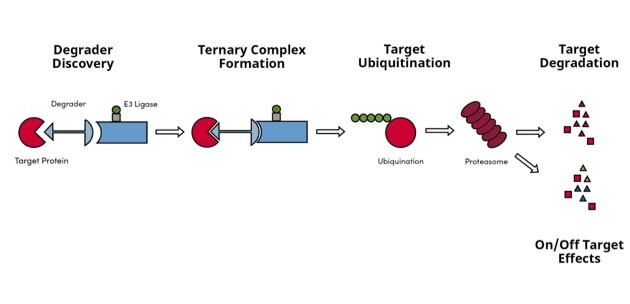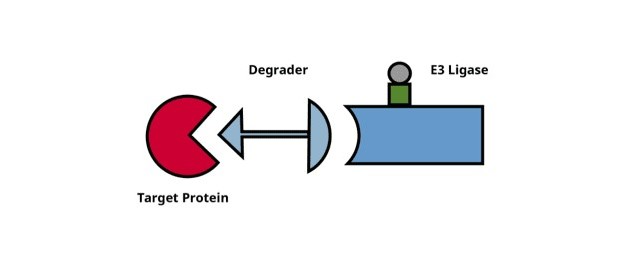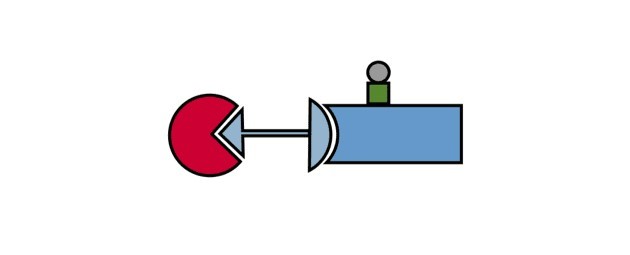Targeted protein degradation (TPD) is a therapeutic approach that uses the cell’s own destructive machinery to break down proteins that cause or drive disease progression. Many of these target proteins lack certain characteristics, like a defined pocket for effector protein interaction, and are “undruggable” using conventional methods. Protein degrader platforms like PROteolysis TArgeting Chimeras (PROTACs), and molecular glue degraders utilize the ubiquitin-proteasome pathway to initiate degradation while platforms like autophagosome-tethering compound (ATTECs), AUTOphagy-TArgeting Chimeras (AUTOTACs), AUtophagy-TArgeting Chimeras (AUTACs), and antibody-based PROTACs (AbTACs), and LYsosome TArgeting Chimeras (LYTACs) leverage the autophagosome or lysosome system. These platforms, along with other TPD modalities, can target previously undruggable proteins for degradation by creating a bridge between the protein of interest and the effector molecule, leading to new strategies for potential targeted drug therapies for a wide range of diseases.
Scientists at Cell Signaling Technology have deep signal technology expertise and can assist you with understanding the on- and off-target effects of your TPD treatment. You can also access a broad catalog with a wide range of products, along with industry-leading proteomic services, than can help you streamline different steps in the TPD discovery workflow, enabling you to better validate a potential TPD molecule.

The TPD drug discovery workflow. (Step 1) Design a degrader that can bind to an E3 ligase and the target protein. (Step 2) Confirm that the degrader forms a ternary complex with the E3 ligase and target protein. (Step 3) Check for target protein polyubiquitination. (Step 4) Quantitate target degradation. (Step 5) Investigate on- and off-target effects to understand the phenotypic consequences of degrading the target protein.

Identify the target protein driving disease progression and the associated E3 ubiquitin ligase in cells or tissues of interest using the following products.

Investigate ternary complex formation using TR-FRET, co-immunoprecipitation, and AlphaLISA to determine the binding efficiency of your TPD molecule and find out if the proximity between the E3 ligase and your target protein is optimal for ubiquitin transfer.
CST offers validated and reproducible off-the-shelf solutions, including tagged antibodies and matched antibody pairs, to support ternary complex formation experiments. Don’t see the conjugation or formulation you need for your platform? CST can develop, optimize, and validate it for you.

Confirm the ubiquitination of your target protein with CST proteostasis antibodies, or obtain a comprehensive view of all ubiquitination sites on your target protein using either a PTMScan® Ubiquitin kit or by utilizing CST Proteomic Analytical Services.

Qualitatively and quantitatively monitor levels of your target protein after a TPD treatment experiment by using any one of a wide variety of specific and sensitive antibodies available in the CST catalog.
Application-validated antibodies for transcription factors, receptor tyrosine kinases, serine/threonine kinases, nuclear receptors, lymphocyte signaling, Jak/Stat proteins, Bcl-2 family proteins, Parkinson’s disease-related proteins, and more are ready to aid your target degradation experiments.
You can find high-quality antibodies against your target of interest that have been validated and approved for use in some of the following applications:
Additionally, off-the-shelf or customized carrier-free antibodies are available for high-throughput ELISA-like platforms. Need a specific conjugation for your platform? Custom conjugation services are also available.
If you are targeting a mutant version of a protein such as EGFR, search through the CST catalog of mutant-specific antibodies. Don't see the protein mutation you are looking for? Contact us about developing, optimizing, and validating it for you.

Get a broad molecular understanding of the off-target effects of your TPD molecule by utilizing CST Proteomics Analytical Services.
Work with a CST scientist to perform the following:
Or use one of the following CST kits: